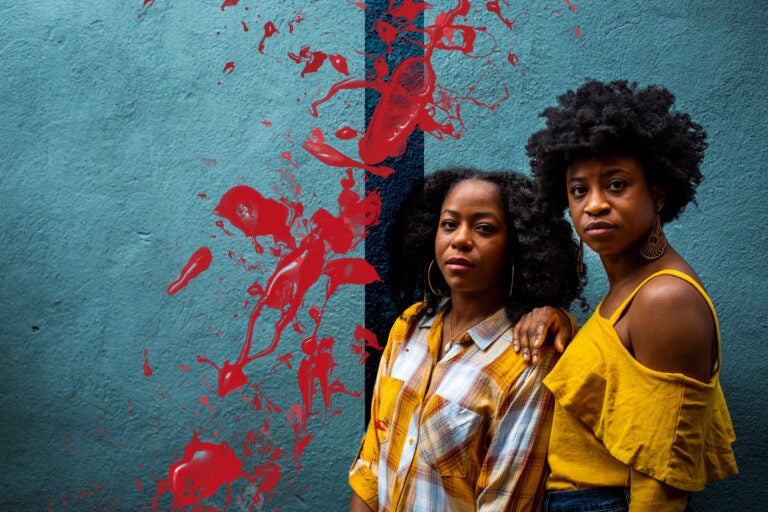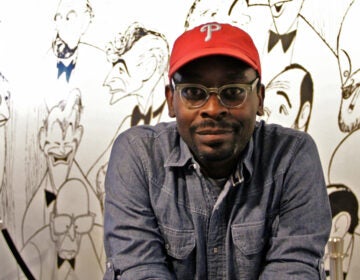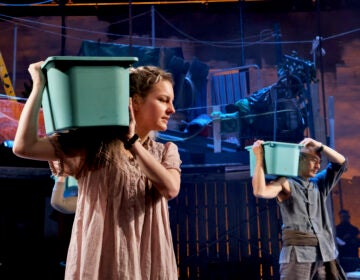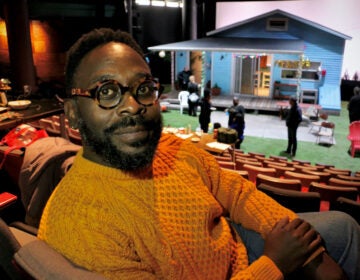With the stage off limits, Wilma Theater tries something new: a radio play
The Wilma Theater will present its final production the 2019-20 season, the Afrofuturist work “Is God Is,” as a radio play — something it’s never done before.

Danielle Leneé and Brett Ashley Robinson in IS GOD IS. (Photo by Wide Eyed Studios)
Are you on the front lines of the coronavirus? Help us report on the pandemic.
The Wilma Theater was supposed to close its 2019-2020 season with “Is God Is,” a gory Afrofuturistic revenge story by Aleshea Harris.
By the time the coronavirus pandemic shut theaters down in March, the costumes had been designed, the set was about to be built, and the actors were just a few weeks away from rehearsals.
“We had about a year of work into the show when the pandemic hit,” said Thom Weaver, who designed the set and lighting. “No one was willing to give up on the show. Everyone was fighting to do it somehow.”
The Wilma could not invite audiences into the theater in Center City for a live performance. The actors could not gather together to shoot a video version of the performance.
Someone floated the idea of having actors perform their parts for a camera in their respective homes, which could be stitched together by an editor. Director James Ijames said that wouldn’t work.
“The violence of the play cannot exist if people can’t exist in the same space together,” he said. “[Harris] is calling on this impulse in humanity to want to beat the thing that has wronged you to death.”
A big component of “Is God Is” is people beating on one another. Like, a lot. Previous staged productions involved buckets of blood.
The theater’s artistic directors concluded the only solution that could work in the COVID-19 era would be to present it like a radio play — something The Wilma has never attempted before.
“Is God Is,” the audio version, was produced with extensive sound design and original music. It will be available to stream, at a sliding-scale cost, from Thursday through Sunday.
Listeners may not be able to see the violence, but you can hear the rage in the actors’ voices, in footsteps squaring off against each other, and in the dull, sickening thud of a blunt object hitting a body.
“This play is less gory than it is brutal,” Ijames said. “They’re not stabbing people, cutting people open. They’re bludgeoning people, which is a kind of violence that feels very intimate and very ancient.”
You can actually imagine something far worse than what could have been contrived on stage.
“I’m someone who is a little squeamish with violence, which is weird that I decided to direct this play,” said Ijames. “There are moments in the play where I have to turn the volume down — not because it’s loud, but because I need a little distance from it.”
“Is God Is,” which won a 2018 Obie award for off-Broadway theater, involves two daughters of an estranged mother named “God,” who urges the sisters to travel the country hunting for their father on a quest of extreme vengeance. It has elements of hip-hop, ancient Greek tragedy and Italian Western movies.
The audio experience has cinematic ambition, with an immersive sonic ambience for each scene, the sound designers giving attention to the way voices resonate in different spaces, like the front seat of a car, a hospice apartment in a rest home and a low-rent office building under the drone of fluorescent lights.
The soundscapes were all recorded and designed after the pandemic shutdown began, along with most of the original music by Daniel Ison.
“There is Afrofuturism and Spaghetti Western and revenge tragedy, so music had to do a lot of heavy lifting,” said Weaver. “Daniel really leaned into an Ennio Morricone western vibe.” (Coincidentally, the recording of “Is God Is” wrapped the day before Morricone, the Italian soundtrack composer famous for “The Good, the Bad and the Ugly,” died on July 6.)
Once Ijames committed to directing a radio play, unexpected aspects of the script opened up to him.
Originally he wanted the title figure, the mother God, to appear physically imposing on stage, a fantastically formidable figure to her two daughters. With only audio to work with, he dug deeper into the characters’ dysfunctional relationships.
“When you don’t know who your mother is, what does she become? If you love her, she can become God. Or, if you don’t love her, she can become the devil,” he said. “The blessing of having to do this as a radio play is I really get to focus on that.”
For Ijames, the violence of the play is both cathartic and revelatory. The impulse for physical vengeance is countered by the recognition of cycles of violence that recur generationally.
“It is the ministry of theater, and I use that term because it feels right, it’s a thing you do to improve the quality of people’s lives,” said Ijames. “That’s what [Harris] is doing in this. At the end of the play, a decision has to be made of whether or not this violence will continue.”

Get daily updates from WHYY News!
WHYY is your source for fact-based, in-depth journalism and information. As a nonprofit organization, we rely on financial support from readers like you. Please give today.




![CoronavirusPandemic_1024x512[1]](https://whyy.org/wp-content/uploads/2020/03/CoronavirusPandemic_1024x5121-300x150.jpg)


